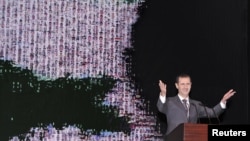CAIRO —
Looking tired, but sounding confident, Syrian President Bashar al-Assad told a crowd of supporters at the Damascus opera house Sunday that he is prepared to hold a dialogue with the opposition, if it observes a cease-fire first.
Opposition leaders dismissed the offer, saying it was devoid of substance.
Assad's supporters gave him a lengthy ovation following his first speech to the nation in more than six months. The Syrian president offered his vision for a dialogue with the opposition and his proposal for a possible solution to the 22-month-old conflict.
According to that solution, the onus is on the opposition to stop armed operations first, and for its foreign backers to stop supporting them, as well.
Assad says the funding and arming of rebel fighters must stop first, along with the halt of what he calls terrorist operations by those fighters, allowing refugees to return home in peace. At that point, he says, government forces will cease operations, keeping the right to return fire.
Previous attempts at a cease-fire have collapsed over opposition insistence that both sides halt military operations simultaneously. U.N. observers withdrew from the country last spring after violence continued unabated, while a brief cease-fire after the Muslim holy month of Ramadan quickly collapsed.
Assad's proposal for a dialogue with the opposition appears to come on his own terms as well, with him refusing to step down and the current government remaining in place while a national dialogue begins.
He says the current government will begin holding intense discussions with all sectors of Syrian society in order to hold a national dialogue conference, including all parties interested in a solution to the crisis, both inside and outside Syria.
In previous attempts at a national dialogue under the auspices of the Arab League, Assad tried to ignore or exclude various components of the opposition outside Syria. This time, however, he included opposition elements both inside and outside the country.
The Syrian president, nevertheless, continued to refer to the armed opposition as "terrorists" and claimed there was no authentic "revolution" in his country.
He says a revolution must have a leader and must have an intellectual foundation. In this case, he argues, there is no leader and no intellectual foundation, because the supporters of the movement are "a clique of criminals" trying to harm the people.
Assad also accused the West of fomenting the conflict in Syria in order to weaken his country and to attract elements of al-Qaida, there, to be rid of them, elsewhere. He went on to thank both Russia and China for supporting his government.
Opposition leaders Walid Bunni and Samir al-Taqi both dismissed the speech, insisting that it contained "nothing new." One Arab analyst told Al-Arabiya TV that Assad was “living in a dream world,” since the rebels are now “at the gates of his palace.”
Opposition leaders dismissed the offer, saying it was devoid of substance.
Assad's supporters gave him a lengthy ovation following his first speech to the nation in more than six months. The Syrian president offered his vision for a dialogue with the opposition and his proposal for a possible solution to the 22-month-old conflict.
According to that solution, the onus is on the opposition to stop armed operations first, and for its foreign backers to stop supporting them, as well.
Assad says the funding and arming of rebel fighters must stop first, along with the halt of what he calls terrorist operations by those fighters, allowing refugees to return home in peace. At that point, he says, government forces will cease operations, keeping the right to return fire.
Previous attempts at a cease-fire have collapsed over opposition insistence that both sides halt military operations simultaneously. U.N. observers withdrew from the country last spring after violence continued unabated, while a brief cease-fire after the Muslim holy month of Ramadan quickly collapsed.
Assad's proposal for a dialogue with the opposition appears to come on his own terms as well, with him refusing to step down and the current government remaining in place while a national dialogue begins.
He says the current government will begin holding intense discussions with all sectors of Syrian society in order to hold a national dialogue conference, including all parties interested in a solution to the crisis, both inside and outside Syria.
In previous attempts at a national dialogue under the auspices of the Arab League, Assad tried to ignore or exclude various components of the opposition outside Syria. This time, however, he included opposition elements both inside and outside the country.
The Syrian president, nevertheless, continued to refer to the armed opposition as "terrorists" and claimed there was no authentic "revolution" in his country.
He says a revolution must have a leader and must have an intellectual foundation. In this case, he argues, there is no leader and no intellectual foundation, because the supporters of the movement are "a clique of criminals" trying to harm the people.
Assad also accused the West of fomenting the conflict in Syria in order to weaken his country and to attract elements of al-Qaida, there, to be rid of them, elsewhere. He went on to thank both Russia and China for supporting his government.
Opposition leaders Walid Bunni and Samir al-Taqi both dismissed the speech, insisting that it contained "nothing new." One Arab analyst told Al-Arabiya TV that Assad was “living in a dream world,” since the rebels are now “at the gates of his palace.”




